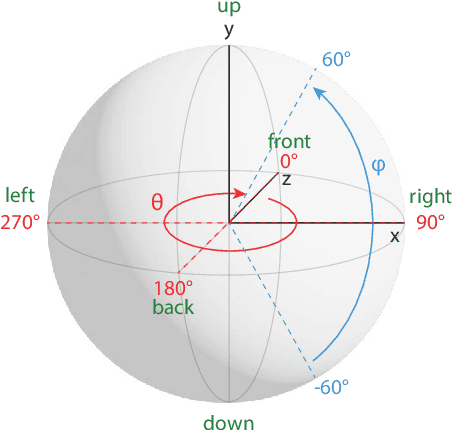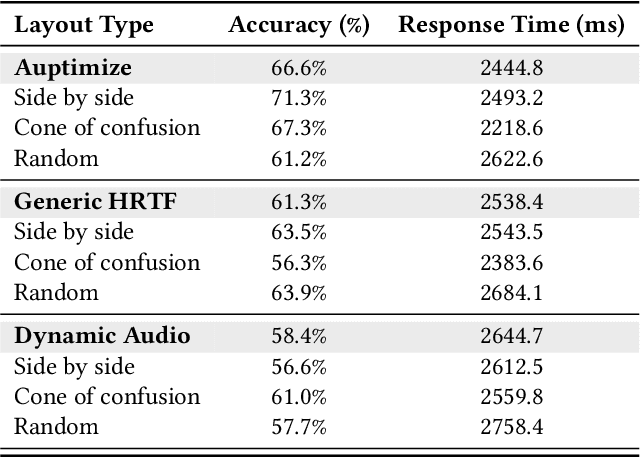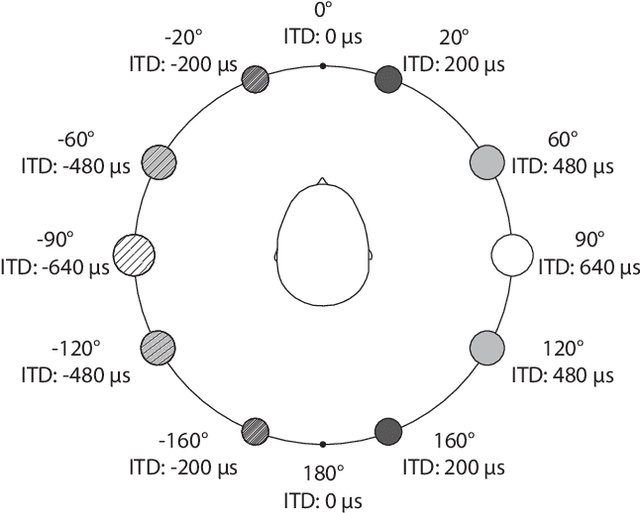David Lindlbauer
Simulating Human Audiovisual Search Behavior
Feb 02, 2026Abstract:Locating a target based on auditory and visual cues$\unicode{x2013}$such as finding a car in a crowded parking lot or identifying a speaker in a virtual meeting$\unicode{x2013}$requires balancing effort, time, and accuracy under uncertainty. Existing models of audiovisual search often treat perception and action in isolation, overlooking how people adaptively coordinate movement and sensory strategies. We present Sensonaut, a computational model of embodied audiovisual search. The core assumption is that people deploy their body and sensory systems in ways they believe will most efficiently improve their chances of locating a target, trading off time and effort under perceptual constraints. Our model formulates this as a resource-rational decision-making problem under partial observability. We validate the model against newly collected human data, showing that it reproduces both adaptive scaling of search time and effort under task complexity, occlusion, and distraction, and characteristic human errors. Our simulation of human-like resource-rational search informs the design of audiovisual interfaces that minimize search cost and cognitive load.
Everyday AR through AI-in-the-Loop
Dec 17, 2024
Abstract:This workshop brings together experts and practitioners from augmented reality (AR) and artificial intelligence (AI) to shape the future of AI-in-the-loop everyday AR experiences. With recent advancements in both AR hardware and AI capabilities, we envision that everyday AR -- always-available and seamlessly integrated into users' daily environments -- is becoming increasingly feasible. This workshop will explore how AI can drive such everyday AR experiences. We discuss a range of topics, including adaptive and context-aware AR, generative AR content creation, always-on AI assistants, AI-driven accessible design, and real-world-oriented AI agents. Our goal is to identify the opportunities and challenges in AI-enabled AR, focusing on creating novel AR experiences that seamlessly blend the digital and physical worlds. Through the workshop, we aim to foster collaboration, inspire future research, and build a community to advance the research field of AI-enhanced AR.
Auptimize: Optimal Placement of Spatial Audio Cues for Extended Reality
Aug 18, 2024



Abstract:Spatial audio in Extended Reality (XR) provides users with better awareness of where virtual elements are placed, and efficiently guides them to events such as notifications, system alerts from different windows, or approaching avatars. Humans, however, are inaccurate in localizing sound cues, especially with multiple sources due to limitations in human auditory perception such as angular discrimination error and front-back confusion. This decreases the efficiency of XR interfaces because users misidentify from which XR element a sound is coming. To address this, we propose Auptimize, a novel computational approach for placing XR sound sources, which mitigates such localization errors by utilizing the ventriloquist effect. Auptimize disentangles the sound source locations from the visual elements and relocates the sound sources to optimal positions for unambiguous identification of sound cues, avoiding errors due to inter-source proximity and front-back confusion. Our evaluation shows that Auptimize decreases spatial audio-based source identification errors compared to playing sound cues at the paired visual-sound locations. We demonstrate the applicability of Auptimize for diverse spatial audio-based interactive XR scenarios.
 Add to Chrome
Add to Chrome Add to Firefox
Add to Firefox Add to Edge
Add to Edge